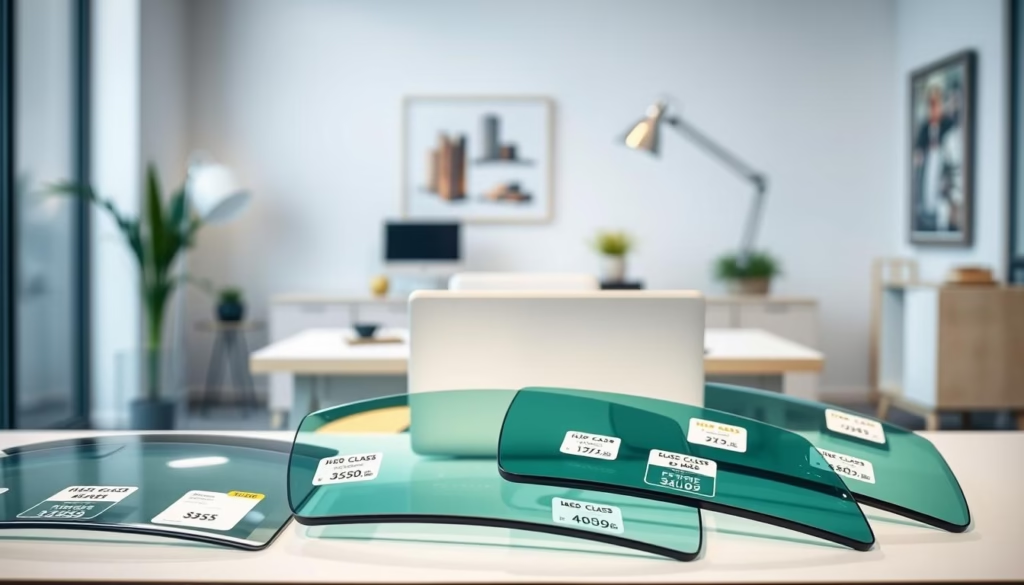Could a small chip cost you hundreds — or nothing at all?
If you carry comprehensive car coverage, many glass repairs are handled with no deductible and the company often pays for full service when needed. That makes it worth knowing how repairs and replacements differ under your policy.
Most minor chips and cracks are fixed without charging the comprehensive deductible, while full replacement usually triggers your deductible unless state rules or your optional plan waive it. You may pick any qualified glass shop, or use a partner vendor that handles the claim and backs the work for as long as you own the car.
Billing is simple: the shop typically bills the insurer directly and you only pay whatever deductible your policy lists. In short, the company covers glass damage when you have the right coverage, and your out-of-pocket depends on whether the job is a repair or a full replacement.
Key Takeaways
- Comprehensive coverage often pays for glass repairs with no deductible.
- Full replacements usually require the deductible unless waived by policy or state law.
- You can use any qualified shop or a partner vendor for streamlined claims.
- Most shops bill the insurer directly; you pay only the deductible shown on your policy.
- State rules vary — check your plan for local exceptions and optional full glass coverage.
Coverage at a Glance: What’s Included for Auto Glass Right Now
When chips or cracks appear from road debris or storms, the primary coverage that kicks in is comprehensive. This type of coverage handles non-collision glass damage such as hail, vandalism, and stray rocks.
Comprehensive coverage and glass claims: repair versus full replacement
Minor damage—like small chips—is often repaired with no deductible. That keeps cost low for the policyholder and speeds service.
Major damage requiring full replacement usually triggers a deductible unless your policy or state rules remove that fee. Some states mandate or allow a $0-deductible option for full glass care.
When collision or another driver’s liability applies
If the glass is broken in an at-fault accident, a collision claim (and its deductible) may apply instead. If another driver caused the incident, their liability coverage should pay with no deductible from your side.
“Check your policy terms and local laws to know which deductible — if any — will apply.”
- Mobile services can often repair or fit glass at home or work.
- Complex vehicles may need shop service for calibration and safety systems.
How to File a Travelers Insurance Windshield Replacement Claim
Start by confirming that your comprehensive coverage and any optional glass add-ons apply to the damage you see. Check policy details for a separate deductible and whether your plan covers full replacements or just repairs.

Pick a shop that fits your needs
Partner vendors can manage the claim, handle paperwork, and back the work for as long as you own the car. Choosing any qualified shop is fine too; the shop will get guidance and bill the company directly.
Begin your claim
To file claim online use the insurer portal or call 1 (866) 336-2077. Keep your policy number, incident date, location, photos, and a short damage description ready.
Service location and payment flow
Many jobs are done by mobile services at home or work. Complex vehicles may need a facility visit for calibration. Typically, the shop bills the insurer and you only pay the deductible that applies.
| Step | Action | Result |
|---|---|---|
| 1 | Confirm coverage | Know if comprehensive or glass option applies |
| 2 | Choose shop | Partner vendor assists or any shop can proceed |
| 3 | File claim | Start service; shop bills company |
Tip: In some states (for example, Florida, Kentucky, and South Carolina) a deductible waiver may apply for full replacement—ask about state rules or optional $0 options.
For quick action, you can also file a claim through the claims portal.
Understanding Deductibles for travelers insurance windshield replacement
How much you pay depends on the type of glass work, state rules, and the options on your policy. Small chips are often fixed without charging the comprehensive deductible, while a full replacement usually triggers the amount you chose when you bought coverage.

Glass repairs: when the comprehensive deductible is usually waived
For minor chips and short cracks, companies commonly waive the comprehensive deductible so you pay nothing out of pocket. This keeps small fixes quick and low cost for the policyholder.
Full replacement: when you’ll likely pay your deductible
If the damage needs a full job, expect to pay the comprehensive deductible unless your plan includes a $0 glass option. Deductibles apply per incident, so separate events can each trigger the fee.
State rules and options
Some states remove or limit out-of-pocket costs. For example, Florida, Kentucky, and South Carolina often waive the deductible, and other states require a $0 glass option. Check policy details or ask your agent.
Accident scenarios: collision vs. not-at-fault outcomes
If you caused an accident, a collision claim may apply and a collision deductible could be due. If another driver is at fault, their liability should cover the loss with no deductible for you.
Tip: Weigh deductible level against premium changes and your emergency savings. Learn more about how an auto insurance deductible works before you decide.
Costs, Parts, and Whether to Use Insurance
Knowing typical costs and part choices helps you pick whether to use your policy or pay out of pocket.

Typical cost ranges: Most standard jobs without insurance run about $250–$400. Luxury or newer cars with sensors and calibration can cost roughly twice that.
OEM vs. aftermarket glass
OEM glass matches factory specs but usually costs more. Aftermarket glass often runs about $100 less and can be a sensible budget choice.
When to file a claim
Use your insurance if the expected cost exceeds your deductible. If the deductible equals or exceeds the job cost, paying directly can avoid a small claim and possible premium impact.
- Ask a professional company for quotes on OEM and aftermarket parts and any ADAS recalibration fees.
- Repairs are often quicker and may be free under comprehensive; they can spare you a replacement deductible.
- Many services are mobile, but some cars need shop work for precise sensor calibration.
Compare quotes and deductible math, and read a useful guide before deciding.
Conclusion
Before you close a claim, confirm whether a repair or full replacement will change your out-of-pocket cost.
With comprehensive coverage, small chips are often fixed with no deductible. A full replacement usually requires paying the deductible unless your policy or state law waives it.
Filing a claim is simple — use the online portal or call 1 (866) 336-2077. You can pick any qualified shop or a partner vendor that manages the process and guarantees the work.
The company typically bills the shop directly, so customers pay only the deductible that applies. In an accident, collision rules or another driver’s liability may determine who pays.
Check your policy details and get professional quotes to weigh cost versus safety and convenience.
FAQ
Does Travelers cover windshield replacement?
Coverage depends on your auto policy’s comprehensive section and any optional full glass coverage. If you carry comprehensive coverage, glass damage from non-collision causes—like road debris or vandalism—will typically be covered. Some states and policy options offer no-deductible glass repairs; check your declarations page or contact customer service to confirm your specific benefits.
What does coverage at a glance include for auto glass right now?
Standard comprehensive protection generally covers cracks, chips, and shattered panes caused by non-collision events. Repair services for small chips are often handled differently than full pane replacement. Optional full glass coverage can expand benefits to include replacement with no deductible in certain states or plans.
How do comprehensive claims differ between repair and full replacement?
Minor chips and cracks can often be repaired without replacing the entire pane; carriers may waive the deductible for repairs. Full replacement is used for larger damage or compromised structural integrity and usually triggers standard deductible rules unless you have a zero-deductible glass endorsement.
When does collision or another driver’s liability apply instead of comprehensive?
If the damage happened during a crash, your collision coverage applies regardless of who caused it. If another driver caused the damage and they are at fault, their liability coverage should pay for your repairs. File a third-party claim or let your carrier pursue subrogation to recover costs.
How do I confirm eligibility in my policy for glass repairs and deductibles?
Review your policy declarations page for comprehensive and glass-specific endorsements. Look for terms like “full glass coverage” or “no-deductible repair” and check state-specific provisions. You can also call customer service or log into the insurer’s portal to view coverages and deductible amounts.
Should I use a carrier partner vendor or my preferred shop?
Using a recommended vendor often simplifies claims, offers direct billing, and guarantees work through the insurer’s network. You may choose any licensed shop, but confirm whether that choice affects direct billing, warranties, or out-of-pocket costs before scheduling service.
How do I start a claim for glass damage?
File online through the insurer’s claims portal, use the mobile app, or call the claims phone number. Have your policy number, vehicle information (VIN and year/make/model), incident date, photos of the damage, and any police report or third-party information ready.
Can repair service come to my home or workplace?
Many vendors offer mobile service that performs repairs or replacements at your location. If mobile service isn’t available, the shop will schedule you at a facility. Confirm appointment times, cure times for adhesives, and any temporary driving restrictions after installation.
How does payment work—does the company pay the shop directly and do I owe a deductible?
Preferred vendors often bill the insurer directly. Whether you pay a deductible depends on your policy and whether the repair qualifies for a deductible waiver. For full replacements, you’ll likely pay the deductible at the time of service unless you have a no-deductible glass option.
When are deductibles typically waived for glass repairs?
Carriers commonly waive the comprehensive deductible for minor repairs to encourage fixing chips before they spread. The waiver applies when repairs restore structural integrity and meet vendor or insurer repair criteria. Confirm with your claims representative.
When will I likely pay a comprehensive deductible for a full pane replacement?
Full replacements usually trigger the comprehensive deductible unless your policy includes a glass endorsement that removes the deductible. Expect to pay the deductible to the shop when the service is performed if no endorsement exists.
How do state rules affect glass deductibles and coverage options?
Some states require carriers to offer zero-deductible glass repair or prohibit deductibles for certain glass claims. Others allow carriers to set policy terms. Check your state insurance department website and your policy for state-specific rules and available endorsements.
What happens in accident scenarios—at-fault collision versus not-at-fault?
If you’re at fault in a collision, collision coverage applies and you’ll pay the collision deductible. If another driver is at fault, their liability should cover your repairs and you wouldn’t owe your deductible; if you pay first, your insurer may seek reimbursement via subrogation.
What are typical cost ranges and how do OEM and aftermarket glass compare?
Replacement costs vary by vehicle make, model, and features like rain sensors or heads-up displays. OEM glass often costs more but matches factory fit and features; aftermarket glass can be less expensive but may lack some factory options. Labor and recalibration of driver-assist systems affect final price.
Should I file a claim or pay out of pocket based on my deductible?
Compare repair estimates to your deductible and potential premium impacts. For minor chips under the deductible, paying out of pocket may avoid future rate changes. For costly replacements that exceed your deductible, filing a claim makes sense. Ask your agent about how glass claims affect premiums.